German Riesling is a thing of beauty. The days of the Blue Nun being the only wine we recognised for the country are long gone!
In recent times we’ve seen the introduction of the quality system supporting the makers of great dry Rieslings from the entire country. 400 years of practice and a warming climate have seen these lifting in quality year after year. Those marginal years when it was near impossible to rippen the grapes are a thing of the past.
The GG’s must be made as dry wines, known for their incredible purity, precision, and, divine acid. The German’s have a way of building the most amazing textures in their Rieslings.
Today we offer a brace of GG’s from some of Germany’s best producers. There is only 6-12 bottles of each available. Given the quality of Keller’s 2018 von der Fels (declassified GG fruit that I can’t stop drinking!) we’re in for some fun with these!
With wines from the Mosel, Nahe, Pfalz and Rheinhessen this is an exception opportunity to explore each region through the wines of some special makers!
All wines are in the country and ready for immediate shipping weather permitting.
About Germany’s Grosses Gewächs ‘GG’ Rieslings
VDP.GROSSE LAGE VDP.GROSSE LAGE®
This is the designation for the highest quality vineyards in Rheinhessen, sites that are precisely delineated by parcel. Here the finest wines are grown, with expressive vineyard character and special potential for cellaring. Think Grand Cru from Burgundy. You’ll find most are made with a splash of skin contact, fermented in large old oak, given space to breathe and evolve.
The 2018 Vintage
2018 was a lovely vintage – a glorious summer with relatively abundant, healthy crops. We’ve tried the wines recently and they are… resplendent. Full of defined fruit, and superbly expressive of site, producer and with excellent shape, freshness and all out deliciousness. These top producers of which most are the next generation, are acutely aware of the changing climate, adapting their farming to make the most of a year like 2018. Coolness, class and character are at large here…
Keller has already noted how the low yields of 2017 allowed his vines to recharge and offer exceptional fruit quality in 2018!
Wittman’s Rheinhessen Vintage Report
A SUPERLATIVE YEAR?
Harvest hadn’t even kicked off yet and the 2018s were already being celebrated in the media as a legendary vintage. This euphoria was to some extent understandable, given the perfect summer and the wonderful, fully ripe, golden-yellow grapes.
SO DO THE WINES LIVE UP TO THE HYPE?
The new year began in Rheinhessen with a wet and relatively warm January, followed by a cold, wintery February and plentiful precipitation in March.
April then quickly switched into a more summer-like mode and sustained high temperatures brought early bud break by the middle of the month. With good access to water, the vines grew rapidly and we literally had our hands full tying up the young shoots.
Fruit set came with the summery late-May temperatures and proceeded fully by the book. A hailstorm on the last night of May did however have us all holding our breath. The damage was fortunately minimal and we worked hard to restore the vines to proper condition.
AND THEN THE HEAT ARRIVED!
A dry, stable high-pressure system brought enduring sunshine over the months that followed and set the stage in our vineyards. The replenishing rains from earlier in the year now came into play.
Our heavy clayey marl and limestone soils once again proved highly adept at retaining just enough of those much-earlier spring downpours. We were lucky to receive a few storms at just the right times to help the vines make it safely through the high temperatures in late July and August.
Based on the significantly accelerated growth cycle, the fruit achieved full ripeness at the beginning of August, much earlier than normal. By the end we were crossing our fingers that August and September would pass without major rainfall. Our hopes were rewarded with truly picture-perfect grapes!
Harvest kicked off on August 28, the earliest date in the history of our estate. The Pinot family grapes were brought in first, with a focus on ripe fruit aromas, moderate alcohol and respectable acidity levels in the final wine.
Our Riesling harvest began on September 14. Here too the grapes didn’t just look good, but also tasted great, with ripe yellow fruits dominant and a hint of tropical fruits as well. We worked right up through October 4, and each day of righteous labor brought outstanding berries to the presses.
The basis for a fantastic vintage was laid in autumn 2018!
Once fermentation was complete, the wines were stored in our deep vaulted cellar, maturing on their lees. We are currently starting to taste the individual barrels and planning our blends. Without question, this vintage has huge potential. Yet as always, we also counsel patience: fine wines need time, often several years.
Dönhoff’s Vintage Report
You’ll recall how Dönnhoff pulled it out of the bag in ‘17. It was a vintage the family had practically written off, after spring frosts decimated the crop. Uneven ripeness across the parcels meant even more passes than usual for the pickers, but the late-season weather yielded a superb if depleted haul from these superb sites in the Middle Nahe. So how did ‘18 measure up? It was a year of abundance, with extreme rainfall in May and June setting things up for a bumper harvest. And then it turned sunny and steady. “Even during the very warm and dry summer especially, the old vines didn’t show any hints of drought stress,” Helmut Dönnhoff told Stephan Reinhardt of Wine Advocate.
“Wherever we had a look, all our grapes were just marvellous, no matter in which vineyard. And the yield was even higher than we expected. The harvest weather was also beautiful, and all the grapes were in perfect condition, as if they were painted.” For his part, Reinhardt says both 2017 and ‘18 are marked by their amazing clarity, and he couldn’t pick between the two. Helmut, too, was extremely happy with the way the latter turned out. “2018 is a very, very good vintage. We got the same concentration and intensity like 2017, but in 2018, this is based on super clear and healthy grapes, whereas the density and structure of the 2017s was due to the heavy reduction during spring frost.”
The Producers
Dr Loosen – Mosel
Loosen has been in the same family for more than 200 years and its present guardian, Ernst Loosen, is one of the great characters of the wine world. He assumed ownership of the estate in 1988 and immediately realised that, with ungrafted vines averaging 60 years old in some of Germany’s best-rated vineyards, he had the raw materials to create stunningly intense, world-class wines. To achieve this, Erni dramatically reduced his crop size and ceased using chemical fertilisers, preferring only moderate use of organic fertilisers. And, most importantly, he turned to gentler cellar practices that allow the wine to develop to its full potential with a minimum of handling and technological meddling.
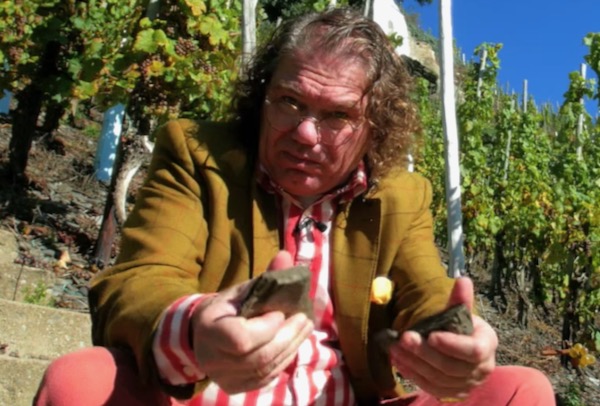
I’ve had the chance to talk with Ernie a couple of times. Yes, he has charisma, there is a lot more going on in his head. He’s a thinker, ever the student of history and nature, he is pushing the boundaries with experiments in his own cellars and as far abroad as the Clare Valley working with the boys & girls and Jim Barry. He’s tirelessly educating the world about German Riesling, I for one am greatful that he has!
Dönhoff – Nahe
Helmut Dönnhoff and son Cornelius make the best wines in the Nahe region and some of the finest anywhere in the world. We can’t possibly overstate how much we cherish and revere these wines. They are sheer perfection in their elegantly defined structure and flawless harmony. The epitome of their meticulous winemaking is the Eiswein. Dönnhoff wines have such power and complexity that their signature weightlessness seems nigh on miraculous. One taste and you sense the magic. These wines are on a par with the best of Germany in a very unique way: the sweet wines rival those of Prüm, Loosen and Egon Müller and the dry wines are mentioned in the same breath as luminaries such as Wittmann and Weil. Very few – if any – have this degree of versatility…
About Cornelius Dönnhoff
Cornelius Dönnhoff bears with him the promise and burden of great expectations. Dönnhoff’’s world-renowned Rieslings were first carried into the international limelight by his father, but now it is the son assuming an increasing share of the responsibility for the estate in the small town of Oberhausen on the Nahe (population 400). “No one knows the Nahe, but everyone knows Dönnhoff,” they say in the USA. And with the recent conclusion of his seventh vintage, this young, university-trained viticulturalist has every reason to smile. He won three consecutive Feinschmecker Cups for his dry Riesling collection, and in 2012 the simultaneous distinction of both “Estate of the Year” and “Best White Wine Collection” from the renowned Eichelmann wine guide.
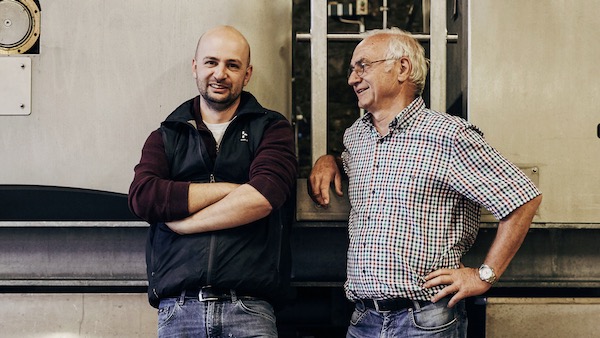
The Dönnhoff family first came to the Nahe region over 200 years ago, and after establishing a modest farm slowly evolved into a full-fledged wine estate. Helmut Dönnhoff has been making the wine since 1971, and now his son Cornelius works alongside in the winery and in their 25 hectares of Erste Lage, or grand cru vineyards. Their holdings represent some of the best in the Nahe and all of Germany. Oberhäuser Leistenberg, the oldest vineyard held by the family, has slate soils and produces fruity wines with elegant acidity. The Schlossböckelheimer Felsenberg is a very old site with porphyry soil. Niederhäuser Hermannshöhle, perhaps the most famous of all the Nahe vineyards, is a slate vineyard with many conglomerates of volcanic rocks, mostly porphyry and melaphyr. The Oberhäuser Brücke, the smallest vineyard in the Nahe, is a tiny parcel saddled on the Nahe River that Dönnhoff owns in entirety. The Brücke has grey slate covered by loess-clay and the vines ripen even later here than in the Hermannshöhle due to large diurnal temperature swings along the river. The Norheimer Dellchen is a steep terraced vineyard in a rocky hollow with porphyry and slate soil. Norheimer Kirscheck sits on a steep south slope of slate soil and produces delicately fruity wines with spice and race. The Kreuznacher Krötenpfuhl vineyard has perfect drainage due its topsoil of pebbles over loam soil; characteristic are wines with a mineralic elegance. Due to the water table that flows beneath the vineyard’s soil the Krötenpfhul has always been farmed organically, even before it was held by Dönnhoff.
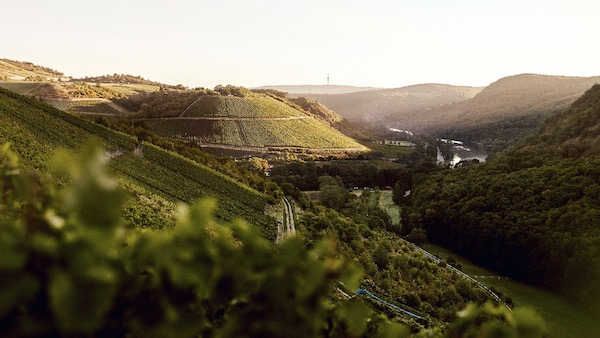
Although the Nahe is a dry region, Dönnhoff does not water their vineyards as to encourage deep rooted vines. The soil is covered with organic material like straw and compost to preserve water and to avoid evaporation and erosion in heavy rains. The vines are all grown on wire frames, low to the ground to benefit from the warmth of the stoney topsoil, and at a density of approx. 6000 vines per hectare. The Riesling vines are old clones sourced from the sites in Niederhausen and Schloßböckelheim.
Grapes are always picked by hand at Dönnhoff over 2-3 passes through each vineyard. To preserve laser-like focus and clarity in the wines, the grapes are pressed as soon as possible – within 3 hours of picking. Wines are fermented in traditional German casks (1200 L stuck and 2400 L doppelstuck) as well as stainless steel with spontaneous fermentations. Donnhoff’s cellar is unique in its capacity to hold all of its production entirely in stainless steel or in cask, allowing for the ideal elevage for any wine at any point during a vintage.
Check out the Video 🎥 in the review below.
Gunderloch – Rheinhessen
Johannes Hasselbach has well and truly hit his stride after taking the winemaking reins from his late father Fritz a few years back. Warm, charming, modest and brilliant Fritz Hasselbach, who passed away from illness in October 2016, was the man who lifted the estate into the Rheinhessen’s top flight. Johannes and the team are taking it even further, turning out stunning wines from top-rated vineyards of the Roter Hang, a steep hill of red slate overlooking the Rhine. The dry Rieslings are intensely concentrated and expressive of the red volcanic soil. The fruity wines are even more so, with their touch of sweetness that acts as a conduit for flavour and aroma. Nackenheim Rothenberg is one of the great vineyards of Germany. Gunderloch was the first winery in Germany to put its entire range under screwcap and holds the ‘claim to fame’ of scoring a hat-trick of 100-point reviews in Wine Spectator. Named in honour of the late, great man himself, Fritz’s Riesling adds a lovely dimension to the line-up.

At the Moment the Hasselbach Family cultivates 24ha of vineyards which are planted with 85% Riesling. Working with our vineyards we feel obliged to preserve the plants and the sanity of the soil for the generations to come. Already with cautious pruning, we are aiming for very low yields around 50 hl/ha. It is our ambition to find the perfect balance of aromatics, fruity acidity and the typical minerality of our slaty soils. of the Grape-Berry. We are fascinated by the harmony between concentration, liveliness and a strong mineralic-deepness.
According to the philosophy of the Hasselbach family, wine is created in the vineyards. Humans can only accompany the creation process and should intervene as little as possible. In their understanding it is never the right way to put their demands over the need of the vineyards. They try to find the right measures to help the vine to find its natural balance in the given circumstances of the growing season. They want to train the vine away from a yield-driven thinking to a more balance seeking approach. Throughout our work with the vines, the growing season in the vineyard, and the vinification process in the winery, it’s the guideline of the Hasselbach family to always seek harmony and balance. Conscientious interaction with nature is an absolute imperative and they treat their vineyards as an irreplaceable treasure. They strive to intervene less and less in the course of nature and focus on their goal of sustaining this natural treasure for future generations. And this is how the wines should taste: unmistakable Ambassadors of our Terroir. Therefore Riesling, as the Terroir variety, plays the main role in our vinery. 85% of our 24 ha of vineyards are devoted to Riesling. But also Silvaner, Gewürztraminer and Pinot Noir play a more and more important role. In addition, we also own smaller plantings of Pinot Blanc, Pinot Gris, Sauvignon Blanc and Portugieser.
Our winery has been founded in 1890 by the Banker Carl Gunderloch. Since then it has been the passion of our family to focus on the Riesling variety which finds perfect conditions in our vineyards. The 250 million year old “Red slate” -Soil from permian times and the special microclimatic setting on the steep slopes next to the impressive River Rhein build the base for the creation of unique wines. At the Moment the Hasselbach Family cultivates 24ha of vineyards which are planted with 85% Riesling. Working with our vineyards we feel obliged to preserve the plants and the sanity of the soil for the generations to come. Already with an cautious pruning we are aiming for very low yields around 50 hl/ha. It is our ambition to find the perfect balance of aromatics, a fruity acidity and the typical minerality of our slaty soils. of the Grape-Berry. We are fascinated by the harmony between concentration, liveliness and a strong mineralic-deepnes.
Check out the Video 🎥 in the review below.
Gunderloch is part of the amazing Wuzelwork Project with fruit swaps across Germany and Austria allowing top winemakers to explore just how much influence winery and winemaker has on the end result!
Wittmann – Rheinhessen
Philipp Wittmann was named Winemaker of the Year 2014 by the Gault Millau Wine Guide, with the judges praising him as “one of the pioneers of organic viticulture and a driving force behind quality developments” in the southern Rheinhessen. “For many years he has produced superb dry Rieslings with fascinating ageing potential,” they went on. “Almost single-handedly he elevated the Morstein site to legendary status.” Philipp’s ancestors have been winegrowers in the old market town of Westhofen since the mid-1600s. His father Günter put the estate on an organic footing, and it’s been a member of organic farmers’ association Naturland since 1990.
Philipp then took the step to go biodynamic in 2004. He lays the foundation for wines of exceptional quality through intensive, year-round vineyard maintenance, low yields and the uncompromising selection of bunches by hand. For the most part, the wines ferment in traditional, old oak casks or stainless steel and fermentation often continues into the year following the harvest. Already firmly established as one of Germany’s superstar producers, this young winemaker has a brilliant future ahead of him. Biodynamic producer
“It’s more like gardening than farming. Everything has to look perfect!” says Philipp Wittmann as he leaps from a vineyard wall to clip a stray vine tip before it grows unruly. This isn’t vanity, though. Handsome though he is, Philipp is all about performance. It’s his duty to coax every vine into the most beguiling wine it can be. Organically certified since 1990 and biodynamic since 2004, Philipp’s parcels of his beloved Rheinhessen are a haven where nature thrives. Limestone rules around his home in Westhofen, whose rocks are the sensory X-factor and texture-lending lifeblood. The Wittmann family owns significant parcels in four grand-cru sites here, with a further GG-in-waiting in neighbouring Gundersheim. “Everything in the Grossen Lagen is treated as GG, regardless of its destination,” says Philipp – explaining why everything from the estate wines up tastes so impeccably distinctive. “I should never start to think about the cost of what I do in the vineyard. I always think about what the vines need to do it well.” You have to love perfectionists like this – those who bounce around, energised by their craft and smiling at the joy it affords. While the Rheinhessen is a lovely place to ripen beautiful Riesling berries, there’s plenty of work to be done. In a warm and relatively bountiful harvest like 2018, soil health, yield balance and canopy management are key to harnessing the sunshine and warmth. Then, in the cellar, a need for patience and restraint in balancing opulence and freshness, fruitiness and sapidity. And all the while retaining that purity, so the wine looks as good in the glass as these perfectly manicured vines on gentle German slopes.
Philipp Wittmann has become a legend in his own lifetime. His Rieslings have an alluring saltiness that draws you in, as well as purity and an inherent coolness. He is amongst Germany’s best. Anne Krebiehl MW, The Wines of Germany
A.Christmann – Pfalz
Steffen Christmann is the current president of the VDP and his biodynamically produced wines are truly terroir-focused, clean and immense. A. Christmann’s history dates back to 1845 when Prof. Dr. Ludwig Häusser, professor of history at Heidelberg University and a member of the Vorparliament of the Pauluskirche together with his cousin Johann Martin, founded a small winery in Gimmeldingen as a hobby. During the next generation, winegrowing grew to become their main profession. In 1894 Eduard Christmann married Henriette Häusser, the granddaughter of the founder. Today the estate bears the name of her son Arnold, and Steffen runs it as seventh-generation custodian.
About Steffen Christmann
Steffen was born in Neustadt an der Weinstrasse in the Pfalz in 1965. He grew up on the family wine estate in the Neustadt suburb of Gimmeldingen. Today, the estate comprises 17 ha of vines and numbers among the Pfalz’s leading wine estates.
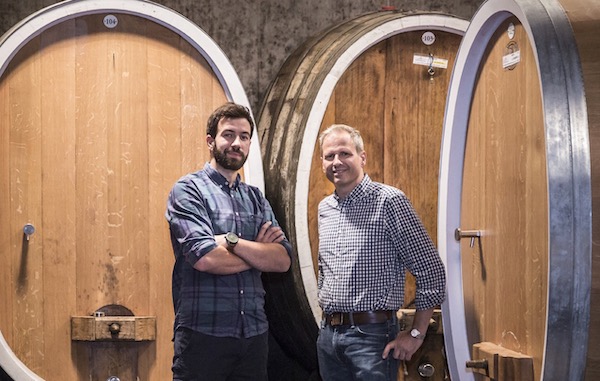
Where in the World are They?
Dr Loosen is based in the Mosel.
Dönhoff is based in the Nahe.
Gunderloch and Wittman are based in the Rheinhessen.
A.Christmann is based in the Nahe
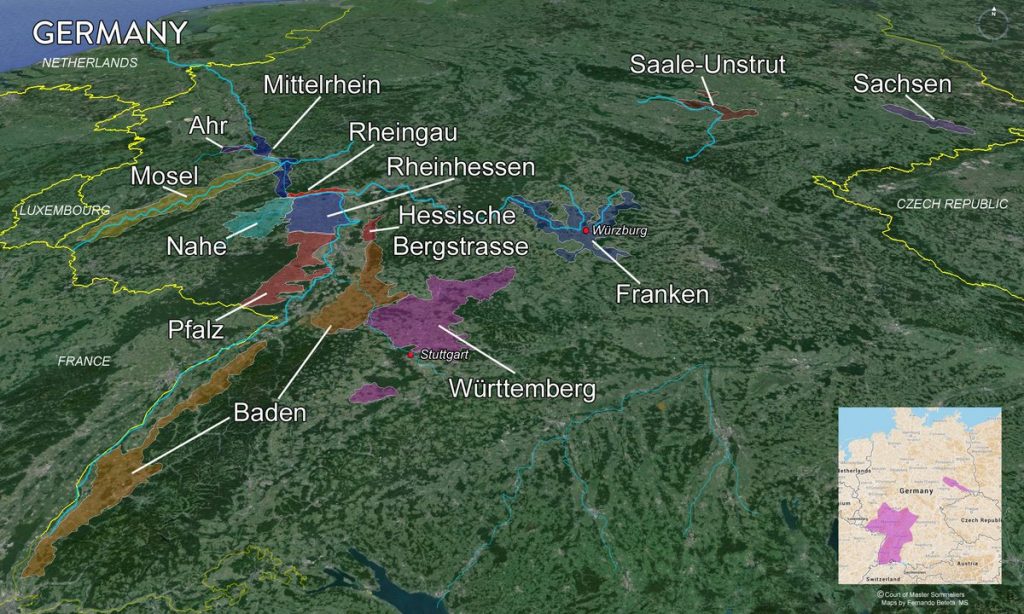
About the Wines
Dr Loosen
2018 Dr Loosen Wehlener Sonnenuhr Riesling Grosses Gewächs
Super fresh, flinty and fine aromas of lemon and grapefruit on offer, as well as wildflowers and stones. The palate has a smoothly resolved texture with supple, lemon and yellowpeach flavors. Long and even-handed finish. Great depth here. Drink or hold
In a fascinating fragrance the Sonnenuhr captures the essence of summer with meadow flowers, cornfields and ripe yellow fruit. On the palate ripe peaches and nectarines are served on a rich texture without exaggerated opulence. Delicate nuances of sweet spice and stony minerality add finesse and there is also enough acidity to give this Grosses Gewächs the classic Mosel vibrancy.
2018 Dr Loosen Ürziger Würzgarten Riesling Grosses Gewächs
Very fresh wildflowers, honey and plenty of spice here with a pithy citrus-fruit edge. The palate has a very composed, detailed and deeply textural feel. Lime-juice flavors are laced with mineral spark and delivered in impressively succulent and spicy mode. Drink or hold.
The nose is seduced by a sweet composition of local and exotic fruit. The sweet juicy taste of nectarines, yellow plums and some rich citrusy notes puts plenty of fruit on the palate; almost too generous, which to some extent overpowers the customary spicy expression of the Würzgarten. Healthy acidity adds a refreshing touch to the finish.
Dönhoff
2018 Dönnhoff Dellchen Grosses Gewächs Riesling
A historic steeply sloping vineyard which Dönnhoff awoke from its slumber. Steep terraces in a hollow with slate and porphyry soils. The vines are about 20 years old and yield about 35hl/ha. 100% selective hand harvest. The must is fermented and the wine matured in classic wooden barrels and stainless steel vats. Vigorously spicy and at the same time dancingly elegant with great depth and fascinating charisma.
A dense and layered white with minerals, salt, white pepper, chalk, dried lemon and subtle pears. Pumice. Wow. Tiny film of oil. Creamy and insane. What a wine. Magic. One for the cellar. Drink or hold.
As pure as the driven snow is just an old cliché, but one might be tempted to leave the description there in view of the inadequacy of words to describe the sophistication of the Dellchen. The fruit is filigree, the minerality cool and invigorating, the acidity exhilarating. Proof that opulence and power are not the be all and end all of great Riesling
2018 Dönnhoff Felsenberg Grosses Gewächs Riesling
The fruit comes from the best steep parcels around Dönnhoff’s Felsentürmchen in the midst of the magnificent Schlossböckelheimer Felsenberg site. It’s outstanding Riesling terroir with a soil of red volcanic igneous rock, a melange of porphyry and melaphyr. Fermented and matured in stainless steel vats and classic oak barrels. A great dry Riesling, very complex, displaying great, smoky crystallised minerality with a flinty character.
This wine is endless with apples, peaches, pears, stone, cream and white flowers. It’s so steady and long. Goes on and on. Pristine. Joyous and captivating. Drink or hold.
Imagine a cool mountain stream running through a citrus-fruit grove and you might be in the mountains of Mallorca, on the other hand you may just be inhaling the ethereal fragrance of Dönnhoff’s Felsenberg. On the palate the delightfully zesty citrus fruit gets a fine sprinkling of mineral dust, tingling acidity and some indefinable savoury piquancy that leads to elation
2018 Dönnhoff Hermannshöhle Grosses Gewächs Riesling
A perfect, steep southern slope with soils consisting of blackish grey slate and volcanic elements, extremely rich in minerals. This legendary site is the best-rated vineyard in the entire Nahe region. The vines are up to 60 years old and give yields of about 40hl/ha. 100% selective hand harvest. The must is fermented and the wine matured in stainless steel vats and classic oak barrels. A very complex Riesling of noble elegance with a hugely intense, rich fullness of flavour and deep mineral tones. A great dry wine with a mysterious, aristocratic character.
2018 Hermannshöhle GG is the finest dry Riesling—not only here but also in the entire Nahe valley
High concentration of flavors in this one with dried apple, pear and salt. Full-bodied, layered and very, very dry with a chalky texture at the end. Minerality with power. Drink or hold
Crystal-clearfruit of mirabelle with the purity of the finest Alsace eau de vie. Add the most delicate fragrant touches of white peach and Williams pear and you are in fruit paradise, though it’s titillation not exuberance this fragrance excels in. The palate works in a similar way, putting exhilarating freshness before juicy abundance. Take a fine sprinkling of mineral rock dust, add the merest hint of exotic spice, and you have a contender for greatest Grosses Gewächs of 2018.
Gunderloch
2018 Gunderloch Pettenthal Riesling Grosses Gewächs
The grapes for this wine grow in the steepest parcels of the Pettenthal grand-cru vineyard in Nierstein, on the imposing Roter Hang slopes of crumbly red slate.
This has richness and density to it with rich, apple and pear-pastry aromas, as well as a fine, perfumed layer. The palate has smoothly resolved, dry-apple and lime-juice flavors with a smooth, quite long and fresh finish. Drink or hold. Screw cap.
On the nose the Pettenthal is still a bit shy, a light breeze of floral and herbal aromas drifting across from a summer meadow. Also still quite gentle on the palate, but already revealing glimpses of citrus fruit and peel, and expertly punctuated by a slightly medicinal notion of green herbs and quinine. Quite exquisite.
2018 Gunderloch Rothenberg Riesling Grosses Gewächs
The Rothenberg grand-cru vineyard encompasses about 20 hectares directly on the Rhine River on the north end of the “Roter Hang” between Nackenheim and Nierstein. Around five hectares of this comprise the heart of the Rothenberg. The vineyard has a slope of 30 to 80% and comprises 290-million-year-old red shale plates. The Hasselbach family of Gunderloch Estate own around 4.5 hectares of this prime vineyard made up predominantly of very steep parcels. Just one small parcel of no more than 20 rows producing the highest quality of grapes are devoted to this wine.
Scintillating pink-grapefruit aromas with breathtaking clarity and purity that reaches ethereal heights. The palate has a smooth and supple build with such attractive, fresh and defined, ripe lemons and grapefruit. Measured acidity, great depth and detail. Drink or hold.
Quite ethereal fragrance of ripe green fruit, citrusy aromas and a fine spicy notion. On the palate the fruit is fairly sweet, but also zesty with pink grapefruit and a dash of exotic spice. In keeping with the vintage the texture is generous, but given clear contours by a tactile phenolic edge
Wittman
2018 Wittmann Aulerde Riesling Grosses Gewächs
Aulerde is Wittmann’s warmest site. Westhofen’s southern to southeastern vineyard slopes rise from the glacial valley of the Rhine to the rim of a high plateau. The Aulerde vineyard lies at the foot of the protective eastern and southeastern slopes of the Kirchspiel site. The vines here face slightly south. The upper layers of a small portion of Aulerde are heavy clayish marl with only a very small amount of limestone. Wittmann’s Riesling grows where the subsoil contains clayey or gravelly sand.
Very intense, lemony notes here with dried honeysuckle, apple curd, bright quince and spearmint. There’s a layered, compressed quality to the center palate, despite the impressive power here, and the acidity drives long and pure. Ripe but well-defined on the finish. Drink now.
A generous fruity fragrance exhibits aromas of ripe apple, peach and pear. The palate adds zesty touches of lime and orange to the sweet and juicy local fruit. Healthy acidity, a salty mineral tang and a subtle phenolic piquancy add contours to the finish.
2018 Wittmann Kirchspiel Riesling Grosses Gewächs
The Kirchspiel grand cru site opens toward the Rhine like an amphitheatre. Its southern and southeastern exposure protects the vines from cold westerly winds – and accounts for the excellent microclimate of the vineyard. The soil structure is similar to that of the Morstein site, marked by clayish marl interspersed with limestone. Limestone is the predominant component of the subsoil, too.
This has a super fine nose with an impression of aromatic elegance and finely defined notes of chalk, white pepper, dry spices and a fresh, lemon and lime-peel edge. The palate has pinpoint acidity and fine, leaf-like detail. The power is very discreet here and the finish is succulent, dry and uber fresh. Drink or hold.
An enticing fragrance brings together floral and herbal aromas of a summer meadow with ripe orchard fruit, creating an aura of summer meadow. The flavour is equally diverse, opening with sweet juicy yellow plums on a viscous palate, but adding tactile mineral notes and a piquant spicy notion to the mid palate. There is also sufficient acidity to stimulate the taste buds
2018 Wittmann Morstein Riesling Grosses Gewächs
The grand cru Morstein site is situated on the south-facing slope that stretches from Gundersheim to Westhofen. The subsoil consists of massive limestone rocks. The first documented mention of the site dates from 1282. Today, Wittmann owns about 4 ha (10 acres) in the best (south-east exposure) parcel of this vineyard. The upper layer of soil is primarily heavy clayish marl interspersed with limestone. The subsoil is also heavy and marked by layers of limestone that help circulate water. This ensures that the vines are well supplied with nutrients and minerals, and may account for the mineral character of the Morstein wines.
Wild yellow flowers blow in a citrusy, salty breeze. Freshly picked nectarines run amok and honeydew melon drips in intensity. Alluring and decadent at the same time with glitzy tension, but ornately spiced stone fruit. The acidity is tempered only by the raw power here. Stoney and tightly constructed, but deep and welcoming. Drink now or hold.
A warm and rich fragrance adds an unusual but seductive notion of Ambrosia rice pudding to the more conventional aromas of ripe yellow fruit. The palate is packed with sweet and juicy fruit flavours, a hint of exotic spice and well-rounded acidity add subtle accents. Despite its generous character, the Morstein shows great purity of taste and does not lose itself in opulence.
A. Christmann
2018 A. Christmann Reiterpfad-Hofstück Riesling Grosses Gewächs
The Reiterpfad site comprises of 60 hectares of red sandstone, formed over millennia from the Haardt hills. The large terraces slope gently towards the east-southeast. The best two portions of the land are to be found in the eastern section, along the wine route. As of 2014 only these two sections, the “Hofstück” and the Rieslings from Christmann are like balm. Though they are never loud, there is something subtle and true about them that gets under your skin. Anne Krebiehl MW, The Wines of Germany “Achtmorgenweg” retain the “VDP Grosse Lage” classification. The rest of the Reiterpfad site has been revised to VDP Erste Lage status. The Grand Cru harvest of the Reiterpfad-Hofstück site takes place after the early harvest. During one or two rounds of picking the grapes are selected according to strict criteria, taking only healthy grapes at the peak of ripeness. The yields are generally around 40hl/ha so that the grapes achieve optimal taste. The whole grapes are carefully transported to the pressing room (Kelterhaus) where they are crushed. After a short period of maceration lasting between 3 and 6 hours, the grapes are slowly and carefully pressed. The must is left to settle overnight and is then fermented using yeast produced by our winery. Until it is ready to be bottled, the unfined and untreated wine is left to mature on the lees and fine lees in both stainless steel vats and large, traditional wooden barrels.
Bitter lemons and orange pith, as well as barely ripe nectarines and loquat. Medium-to full-bodied with raw power to the acidity and crystalline purity to the citrus fruit. Long and mineral on the finish. Drink now or hold.
Gentle like all Christmann’s Grosse Gewächse, particularly on the nose, but nevertheless enticing with subtle herbal and fruity aromas. The palate combines the taste of fresh pear with fine nuances of spice and dried herbs. A little more luscious than in other vintages, but still putting subtlety and elegance first.
2018 A. Christmann Idig Riesling Grosses Gewächs
Idig was more or less forgotten until the early 1990s, when the Christmann family of Gimmeldingen purchased choice parcels of the original site and “put Idig on the map”, with recognition and awards by leading German and international wine critics for its top Rieslings. Idig is the cornerstone of the A. Christmann estate and one of the most highly-prized sites in the Pflaz. It’s situated on top of solid limestone, deposited in the tertiary age from limestone deposits created during the break-up of the Upper Rhine Plain. The top layers of the site are made up of “terra fusca”, a combination of chalk, clay and red sandstone eroded from the Haardt hills over millennia and deposited on the slopes of Mittelhaardt. In the top layers of the soil there is a large amount of limestone but also a substantial amount of basalt. The GG grapes are selected according to strict criteria over one or two rounds of picking, taking only healthy fruit at the peak of ripeness, with yields generally around 40hl/ha
This is a remarkably mineral and taut style with dried citrus, quartz, ivory and brightly squeezed citrus. Edgy and compact on the palate with subtle, caressing phenolics and vibrant, bright acidity. Long and very citrusy on the finish. Drink now or hold.
One could be tempted to call Steffen Christmann’s Idig the minimalist among Riesling Grosse Gewächse. Whereas others may revel in opulence, particularly in 2018, the Idig excels in noble restraint. But it is exactly this understatement of individual components, whether they be herbal, mineral or fruity, which allows the taster to focus on balance and elegance as the key elements of one of the most sophisticated of Germany’s Grosse Gewächse. The thinking-person’s Riesling
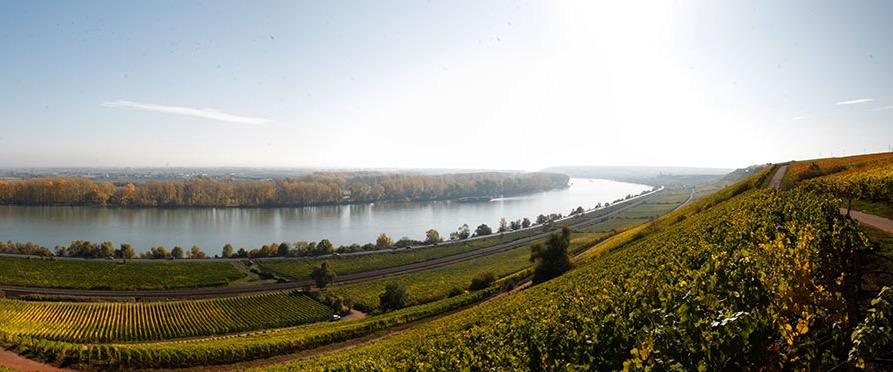



You must be logged in to post a comment.